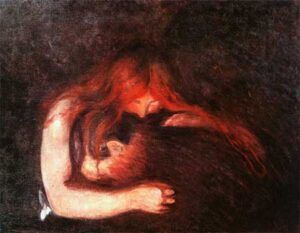The Greek equivalent of the Slavic/European vampire was called the “vrykolakas” derived form the older Slavic term “vblk’b dlaka”, meaning wolf pelt wearer. One story about these creatures was told by Phlegon, a freedman who lived during the time of the Roman Emperor Hadrian. About six months after her death, Philinnon, the daughter of Demostratus and Charito, had been observed entering into the room of a young guest named Machates. When Charito questioned Machates the next morning about his visitor, he admitted that the girl’s name was Philinnon. He then showed them the accessories she had left behind: a ring and a breast band. The parents immediately recognized the objects as belonging to their late daughter. The next night, Philinnon again came to Machates’ room, but this time, her parents, anxious to see her, dropped in. Philinnon reprimanded them for interrupting her time with Machates. She had been given three nights with him, but because they interfered, she would die again. Before their eyes, her body once again turned into a corpse.
Phlegon was a town official called to keep the rumor of Philinnon’s revival hushed up before it spread all over town. Upon examination of her burial vault, he found several gifts she had taken from her visit with Machates, but no body. A local wise man advised that the body be burned and given the appropriate purification rituals and propitiatory rites to the deities.
Early accounts of these beings described those who arose from the dead to attend unfinished business usually with a relative or close association. There also were stories of those who stayed for long periods of time, and even one who went off to a different location, married, and fathered children.
Becoming a Vrykolakas
There were a couple of circumstances that predisposed someone to becoming a vrykolakas. First, a parent or associate could curse the individual in a manner similar to Oedipus against his undutiful son. Oedipus called upon Tartarus to refuse to receive the son and to drive him forth from his place of final rest. Second, an evil or dishonorable act against one’s family such as the murder of a sibling or committing adultery with a sister- or brother-in-law. Finally, a violent death or improper burial could predispose one to becoming a vrykolakas.
When the Greek Orthodox church became a powerful influence on Greek lifestyle, it found itself having to deal with this popular belief in vrykolakas. It argued that the devil inhabited the body of the dead and caused it to move. It also occasionally tied such occurrences to those of mediums such as in the biblical story of the woman at Endor (I Samuel 28). Eventually, the Church proposed that anyone night be predisposed to becoming a vrykolakas if they died in an excommunicated state, if they were buried without proper church rites, if they died a violent death, if they were stillborn, or if they were born on one of the great church festivals.
Reference
- Article: Vampires: A Brief History
- Buy From Amazon.com: Vampire Book: The Encyclopedia of the Undead











 African Witchcraft and Vampirism
African Witchcraft and Vampirism